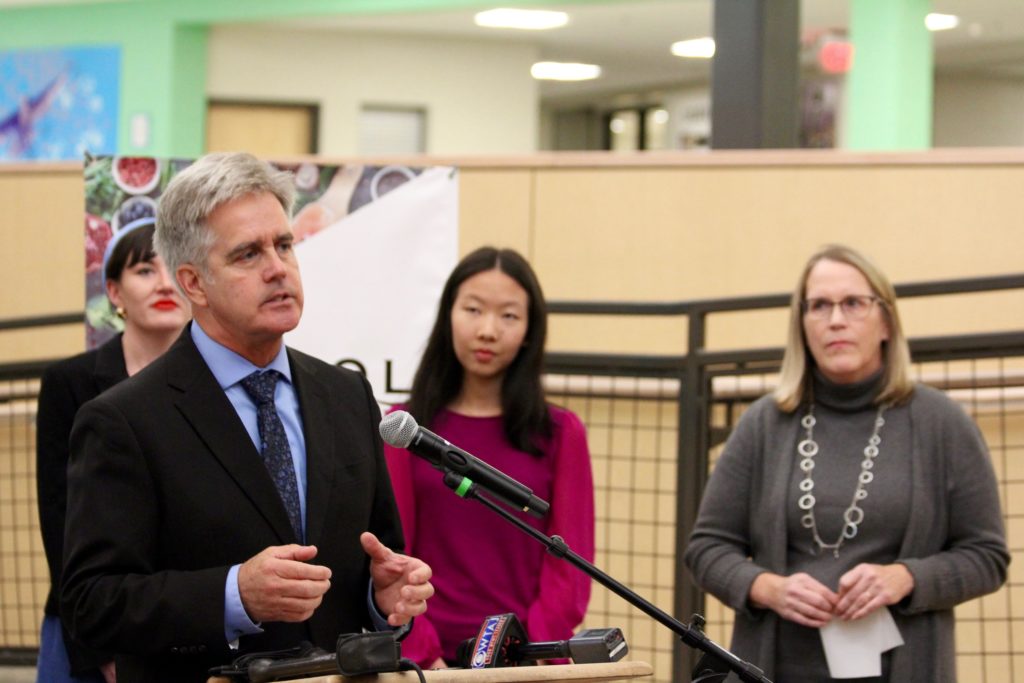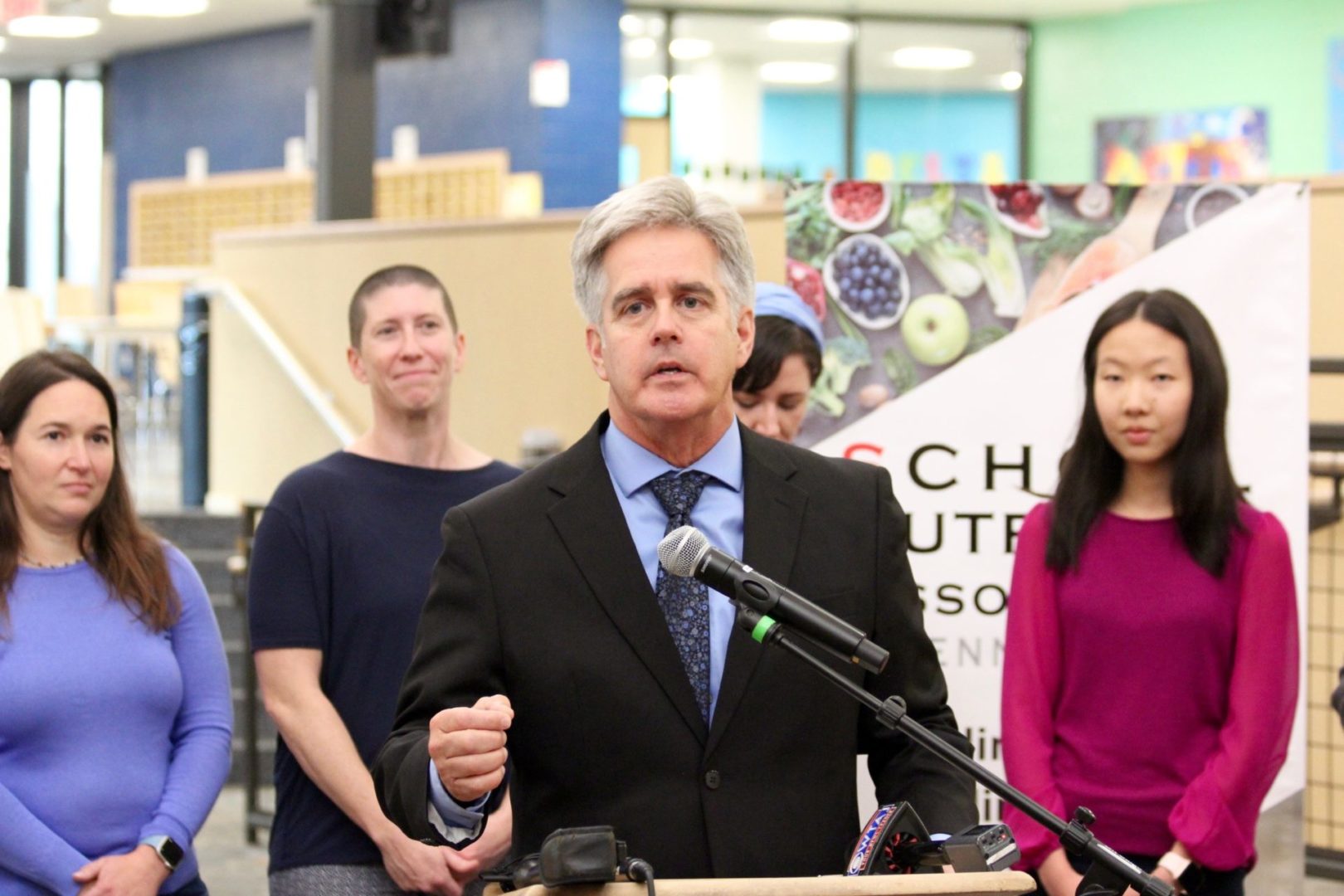State Rep. Scott Conklin, D-Rush Township, joined State College Area School District representatives on Wednesday to call for a permanent statewide program that would provide no-cost breakfast and lunch to all of Pennsylvania’s nearly 1.8 million K-12 students, regardless of family income.
Conklin is a co-sponsor of House Bill 2829, which would amend the school code to guarantee free K-12 breakfast and lunch and allocate $275 million in the state budget for a Universal School Meal Fund, which along with federal dollars would make the guarantee possible.
“One of the most important things we can give our children is the ability to not have food insecurity, to give them that ability that they can start out their morning with breakfast, know at lunch time that they have something to eat,” Conklin said during remarks to students, staff and press at the Delta Building on State High’s north campus. “Because if you really want a child’s mind to work, you have to give it more than just an education. You have to give them that very substance that helps them grow…”
For the first two years of the COVID-19 pandemic, federal waivers for the U.S. Department of Agriculture’s National School Lunch Program made meals at K-12 schools free for all students, but they were not renewed for 2022-23. In September, Gov. Tom Wolf directed $21.5 million to provide universal free breakfast through the end of this school year, but anti-hunger advocates, school professionals and some lawmakers have urged a greater and more permanent effort.
Megan Schaper, SCASD director of food services and current president of the School Nutrition Association of Pennsylvania, said that when universal free school meals were available, the benefits to students, families and educators were readily apparent.
“When all children had access to free meals over the past two years as part of the USDA’s response to the pandemic, we saw how students, families and educators benefited,” Schaper said. “Obviously, access to school meals reduces childhood hunger, but the benefits do not end there. They also decrease obesity, reduce absenteeism, reduce discipline problems and result in fewer visits to the school nurse.”

Access to school meals also has been shown to improve attentiveness and learning outcomes.
“Reducing the barriers to accessing meals ensures that more students reap these benefits,” Schaper said.
Speakers on Wednesday pointed to several issues that having free school meals available to everyone helps to solve.
One is that under the current income-based program, students who are approved may feel a stigma attached to receiving free and reduced meals, even as participating families are kept confidential by the school.
“What we did see over the past two years when meals were free to everybody that went away,” Schaper said. “There was an equal playing field. Every child felt very welcomed coming into the cafeteria and we saw tremendous participation and knew every kid was being well nourished and well taken care of.”
Claire Chi, a State High junior, serves on the Pennsylvania Board of Education and several statewide student organizations. In those roles she says she has heard from students across the commonwealth who found when universal free meals were available it “mitigated the stress and stigma associated with the access to food assistance in schools.”
“Even students not from low-income families say that they ate and learned better than before the all-inclusive meal funding,” Chi said. “A universal school meal program would relieve food insecurity exacerbated by the pandemic, support child nutrition for every K-12 student in Pennsylvania and ensure equitable access to a full learning experience in schools statewide.”

The current system also doesn’t account for hardships a family may be facing, Schaper explained. As it is, eligibility is based only on household income and size. Some families, though, may have greater income but are facing difficulties like extensive medical bills.
About 18% of SCASD students qualify for free or reduced-price meals, lower than the statewide average of nearly 50%, Schaper said. (For 2022-23, SCASD allocated funds to ensure those who qualify for reduced-price meals can receive them for free.)
Every year, though, SCASD receives applications from families who are above the income threshold but need some help, Schaper said. While SCASD’s food services staff do their best to help those families, they most often have to be turned away from the program because of the federal guidelines.
“The way the program is set up right now, there are a lot of people who fall through the cracks and really could use the help and aren’t eligible to get it,” Schaper said.
Jim Fogleman is the lead custodian at the Delta Building and sees students at breakfast and lunch time every day. The difference between when universal free meals were available and this year is noticeable, he said, as he sees more kids without food in front of them.
“…Maybe they’re not hungry, but I think it’s important that we should offer those kids something to eat if they are so they don’t feel… who knows what’s going on at home? Maybe they do need that meal and we don’t know it,” Fogleman said. “If we set a guideline and just set a number, we’re not truly helping all the kids. I think it’s important that this bill passes for that very reason. If you look now, the number of kids that sit out in that cafeteria in the morning with nothing in front of them is enormous.”

Oct. 10-14 is National School Lunch Week, and Schaper said it is “the perfect time” to commit to universal free school meals. Doing so would not only offer the health and educational benefits for students, but would also reduce administrative work, allowing food services to develop innovative programs and be a more active partner in teaching students about healthy eating.
“I know that this legislation has the potential to transform school cafeterias so that we can serve children better,” Schaper said.




